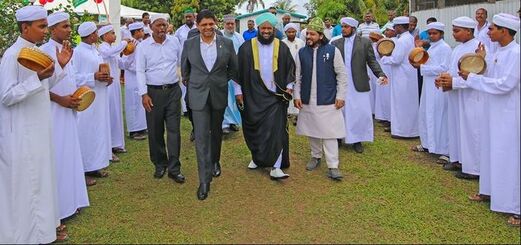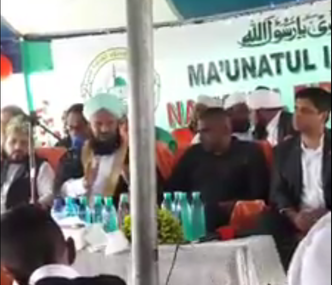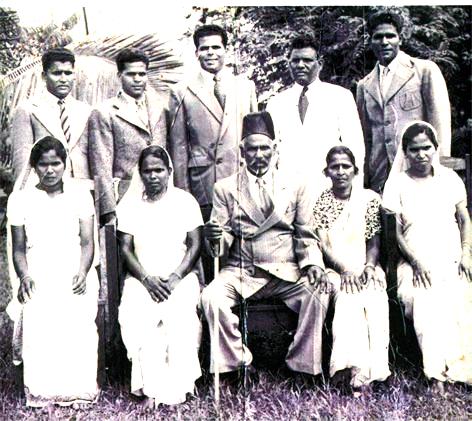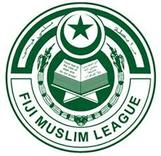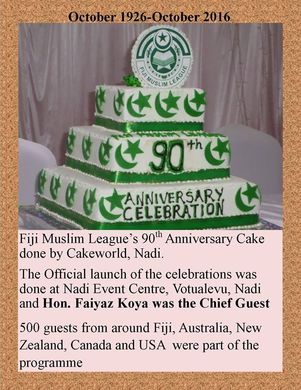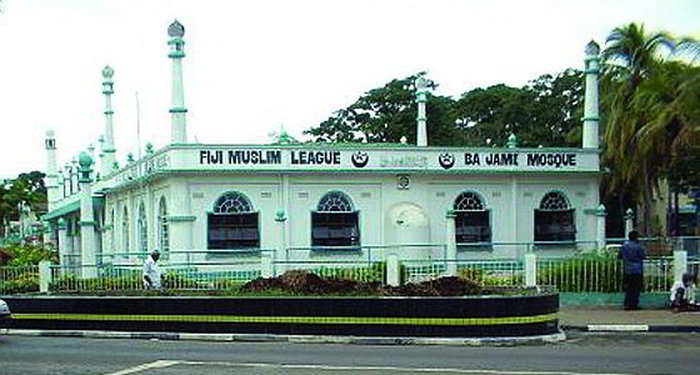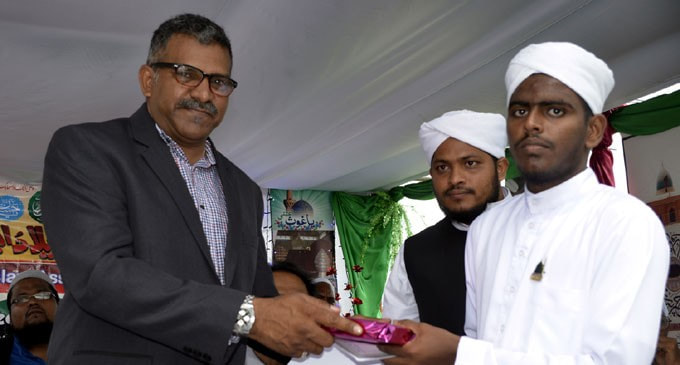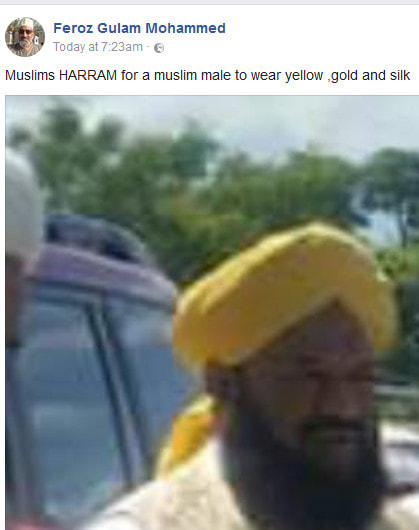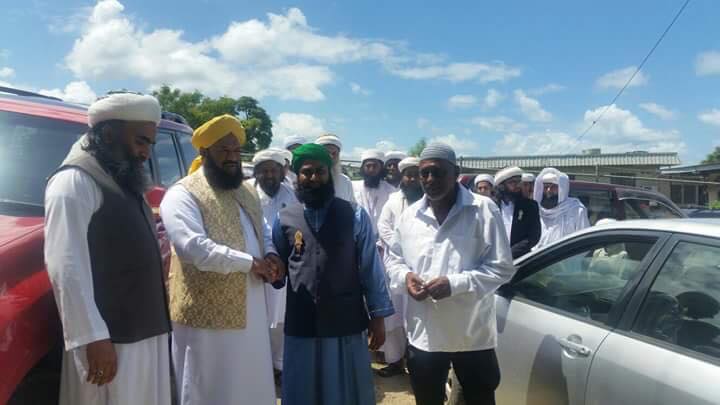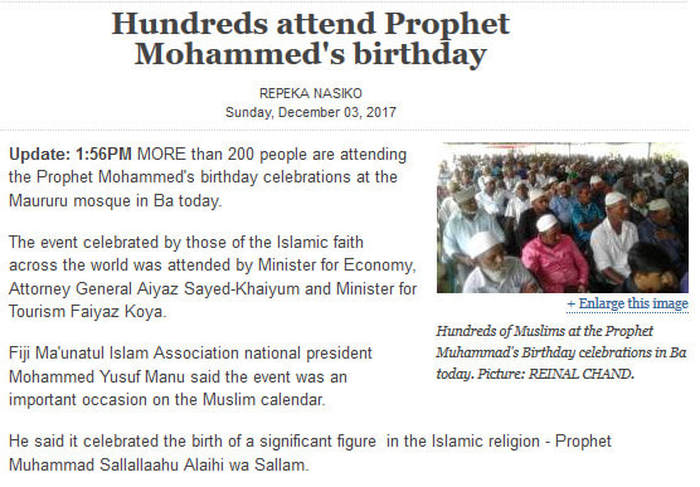FOR THE RECORD: Maulana Ahmed Nakshabandi from Hyderabad in India (with Aiyaz Khaiyum and Faiyaz Koya) was speaking at the Prophet Mohammed's Birthday celebrations in Ba's Maururu Jamie Mosque (see video below). Aiyaz Khaiyum and Faiyaz Koya were chief guests at the Maunatul Islam Association of Fiji that represents about 30 per cent of the Sunni Muslims in Fiji who are mostly followers of the Shafi school of jurisprudence. The followers of Imam Shafi in Fiji are the descendants of Muslims of Malayalam origin who came to Fiji under the indenture system from Kerala in South India between 1903 and 1916. The organisation originally operated under the name of Then India Maunatul Islam of Fiji since it was officially formed in 1942. The name of the Association was changed in 1982 to Maunatul Islam Association and its head office is situated at 72 Vomo Street, Drasa/Vitogo in Lautoka. One of the most prominent past President and Speaker of the Association was the late Siddiq Moidin (S.M.) Koya, the leader of the National Federation Party and Leader of the Opposition. His two sons, Faizal (NFP) and Faiyaz (FFP), are still active and prominent members of MIA in Fiji. HAJJI Moidin Koya (with cap in the front row picture below) was national president of MIA, Fiji. He was the father of the late S. M. Koya
WATCH VIDEO BELOW WHERE KHAIYUM IS DESCRIBED AS "KING OF FIJI". Opinion is divided on whether Khaiyum is "SULTAN OF FIJI" or "KINGFISHER". Moreover, the Maulana also wrongly claims that it was FFP Minister Faiyaz Koya who obtained a public holiday on Prophet Mohammed's birthday when the truth is the birthday has been a public holiday for decades. Religion, mixed with untruth and echoes of politicking, must be discouraged at such holy gatherings. Faiyaz Koya, sitting next to the Maulana, should have corrected him on the spot. During his lecture the Maulana was at one point interrupted by Khaiyum as he was lavishing praise to jokingly say to him (the Maulana):
'You should be in politics.'
WE, however, have no objection to the Maulana's presence in Fiji. After all, preachers from different Hindu and Christian sects are regular visitors to Fiji. The Maulana's description of Khaiyum as 'King' in the current Fiji context is open to different interpretations - depending on one's view of Khaiyum. And, we must not forget that racist, coupist, SODELPA leader and Methodist lay preacher
Sitiveni Rabuka:
"Hindus and Muslims are pagans who need to be converted to Christianity, if not we will all become pagans like them"
The other Sunni Muslim organisation in Fiji, the FIJI MUSLIM LEAGUE, represents all other Sunni Muslims in Fiji who are mostly followers of the Hanafi school of jurisprudence. In 2000, in LETTERS TO EDITOR, they were viciously savaged by 'Student Khaiyum, University of Hong Kong'
"Most Muslims in Fiji know that certain officials treat the League and its branches as their own little fiefdoms. Fiefdoms, where nepotism is known to be rampant at most times; where certain families and individuals have reigned as executives literally for decades; where children and families of well-to-do officials benefit from scholarships which were and are meant for poor students; where chairs of numerous committees are held by single individuals; where businessmen and business interests are over represented; where women, the youth, various provinces and other denominations are either underrepresented or not represented at all; where appeals to religious dogma and unity are utilized in response to queries of administrative/financial discrepancies and where certain individuals view the League merely as a means to acquire access to power, influence and ultimately money - all under the guise of protecting Muslim interests...The executive of the League cannot and does not represent the political opinion, views, philosophies of individuals or the bulk of Muslims in Fiji. These self appointed guardians do not speak for the masses."
Letter: Critique of FML decision to make submission to Constitution Commission
by A S Khaiyum
The claim by some executive members of the Fiji Muslim League ('League') that Muslims support a review of our [1997] Constitution [of Fiji] and demand separate seats merely because the executive says so is a gross misrepresentation of the views of the everyday and majority of Muslims in our country.
The executive lack the mandate to speak as a representative body for Muslims since the League has been and is essentially an administrative institution managing and maintaining mosques, schools, orphanages, a sugar cane farm and real estate.
In addition to the lack of mandate the arguments and justifications espoused by the executive for a review and separate seats are flawed. They are flawed because our [1997] Constitution [of Fiji], in particular the Bill of Rights, namely, sections 38(2) and 35 more than adequately guarantee and protect religious freedom and minority rights. Indeed if an almost identical South African Bill of Rights provision protects the rights of the minority South African Muslims then what is so special about and differentiates Muslims in Fiji?
On the basis that last century the then nascent League made submissions on separate seats, it is argued today that so called Muslim rights will be achieved if these seats as submitted then are allocated now. To refer to a resolution passed some seventy years ago, in an era with its own specificities and dynamics, as justification for separate seats in today's Fiji illustrates a complete ignorance and denial of our political, social and constitutional history/experience as a nation-state.
Indeed if we were to hark back and uphold the standards of 1929 then commoner indigenous Fijians and women would not have the right to vote. Fiji and the rest of the world have moved along. Clearly such absurd referrals to the past illustrate an enormous vacuum in basic critical thinking and analysis, discourse and a general prevalence of obscurantism within the executive.
Furthermore, it aptly demonstrates a complete ignorance of contemporary developments in and interpretations of Islamic law and jurisprudence vis-a-vis constitutional, human rights and international law and conventions. More tragically, however, the opportunism of the executive displays the absence of and lack of belief in justice, compassion, selflessness and basic human decency.
Most Muslims in Fiji know that certain officials treat the League and its branches as their own little fiefdoms. Fiefdoms, where nepotism is known to be rampant at most times; where certain families and individuals have reigned as executives literally for decades; where children and families of well-to-do officials benefit from scholarships which were and are meant for poor students; where chairs of numerous committees are held by single individuals; where businessmen and business interests are over represented; where women,the youth, various provinces and other denominations are either underrepresented or not represented at all; where appeals to religious dogma and unity are utilized in response to queries of administrative/financial discrepancies and where certain individuals view the League merely as a means to acquire access to power, influence and ultimately money - all under the guise of "protecting Muslim interests."
Indeed the absence of proper representation, transparency, accountability and ultimately legitimacy also plague other local institutions in contemporary Fiji.
The executive of the League cannot and does not represent the political opinion, views, philosophies of individuals or the bulk of Muslims in Fiji. These self appointed guardians do not speak for the masses.
Therefore, the current administration and all Fiji Islanders must understand and recognize the majority of Muslims who believe in basic human decency, justice, democracy and constitutionalism reject the idea of separate seats and/or a review of our [1997] Constitution [of Fiji].
Aiyaz Sayed-Khaiyum
University of Hong Kong
Hong Kong
[email protected]
Maulana Ahmed Nakshabandi's visit to Fiji has divided Indo-Fijian Muslims
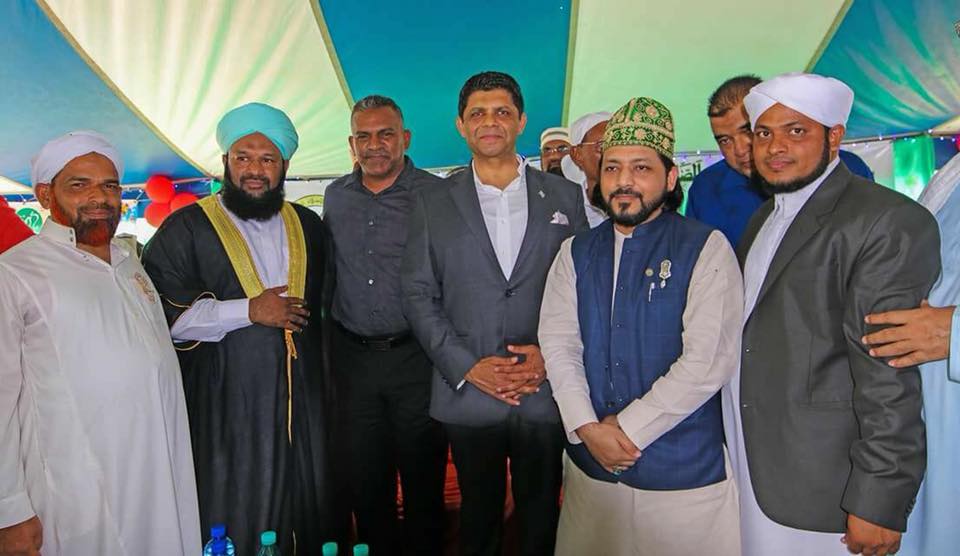
BA, 3 December 2017: Maunatul Islam Association of Fiji national Eid meelaadunnabi jalsa with Acting prim minister attorney general Aiyaz sayed khaiyum and trade and tourism minister Faiyaz Siddiq koya and moulanas mohammed Ahmed Naqshbandi from Hyderabad, India, Sayyed sufi Ajmal Qibla from Nizamuddeen Darga in New Delhi
